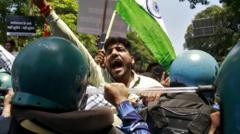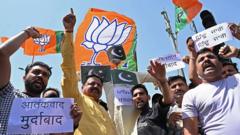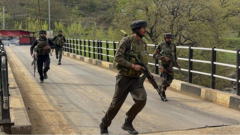In the aftermath of a lethal attack in Kashmir that claimed over two dozen lives, the Pakistani government has opted for a cautious diplomatic stance, emphasizing a desire to avoid escalation with India. However, apprehension grows among the public as Indian officials express intentions of potential military responses, stirring the fears of increased conflict between the two nuclear-armed nations.
Kashmir Attack Triggers Tensions: Pakistan Prepares for Possible Indian Retaliation

Kashmir Attack Triggers Tensions: Pakistan Prepares for Possible Indian Retaliation
As tensions escalate following a deadly attack in Kashmir, Pakistan reassures peace while India signals potential military action.
Following the attack on tourists in a contested region, the Indian government has released statements alleging Pakistani involvement, while simultaneously suspending key treaties. In response, Pakistani officials are convening the National Security Committee to discuss further action.
The situation has various experts weighing in with differing perspectives. Some analysts highlight the risks of an unstable military confrontational cycle, while others warn that the aggressive posturing from both sides could lead to broader regional instability. Historically, similar incidents have provoked fierce retaliation and a cycle of violence, and both nations are entangled in a complex web of accusations and counter-accusations.
As the world watches, the unfolding events raise critical questions about the future of peace in South Asia and the intricate balance required to manage longstanding rivalries.
The Indian media swiftly implicated Pakistan in the attack, an allegation that the Pakistani government categorically denied, instead suggesting that India is attempting to distract from its internal security issues.
The unfolding diplomatic dialogue now holds the potential to either escalate tensions or pave the way for negotiation, but the next steps from both governments will be crucial in determining the direction of this volatile situation.
The situation has various experts weighing in with differing perspectives. Some analysts highlight the risks of an unstable military confrontational cycle, while others warn that the aggressive posturing from both sides could lead to broader regional instability. Historically, similar incidents have provoked fierce retaliation and a cycle of violence, and both nations are entangled in a complex web of accusations and counter-accusations.
As the world watches, the unfolding events raise critical questions about the future of peace in South Asia and the intricate balance required to manage longstanding rivalries.
The Indian media swiftly implicated Pakistan in the attack, an allegation that the Pakistani government categorically denied, instead suggesting that India is attempting to distract from its internal security issues.
The unfolding diplomatic dialogue now holds the potential to either escalate tensions or pave the way for negotiation, but the next steps from both governments will be crucial in determining the direction of this volatile situation.





















